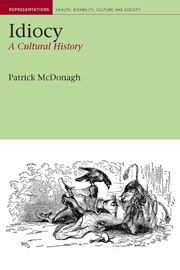Book contents
- Frontmatter
- Contents
- Preface and acknowledgements
- 1 Introduction: idiocy, culture and human relations
- 2 ‘Stripping our own hearts naked’: William Wordsworth and John Wilson read ‘The Idiot Boy’
- 3 A ‘pupil of innocent Nature!’ The wild boy of Aveyron goes to Paris
- 4 Diminished men: masculinity and idiocy
- 5 Essential women: femininity and idiocy
- 6 Holy fools, witty fools, depraved fools: folly, innocence and sin
- 7 History, society, economy: holy fools and idiots come home in nineteenth-century literature
- 8 Barnaby Rudge, idiocy and paternalism: assisting the ‘poor idiot’
- 9 Innocence, philanthropy and economics: the new ‘asylum’ idiot
- 10 Sensational idiocy
- 11 ‘The sins of the fathers’: idiocy, evolution and degeneration
- 12 Danger and degeneracy: the threat of the urban idiot
- 13 The problem of the feeble-minded: the Royal Commission, eugenics and eternal chaos
- Epilogue
- Bibliography
- Index
4 - Diminished men: masculinity and idiocy
- Frontmatter
- Contents
- Preface and acknowledgements
- 1 Introduction: idiocy, culture and human relations
- 2 ‘Stripping our own hearts naked’: William Wordsworth and John Wilson read ‘The Idiot Boy’
- 3 A ‘pupil of innocent Nature!’ The wild boy of Aveyron goes to Paris
- 4 Diminished men: masculinity and idiocy
- 5 Essential women: femininity and idiocy
- 6 Holy fools, witty fools, depraved fools: folly, innocence and sin
- 7 History, society, economy: holy fools and idiots come home in nineteenth-century literature
- 8 Barnaby Rudge, idiocy and paternalism: assisting the ‘poor idiot’
- 9 Innocence, philanthropy and economics: the new ‘asylum’ idiot
- 10 Sensational idiocy
- 11 ‘The sins of the fathers’: idiocy, evolution and degeneration
- 12 Danger and degeneracy: the threat of the urban idiot
- 13 The problem of the feeble-minded: the Royal Commission, eugenics and eternal chaos
- Epilogue
- Bibliography
- Index
Summary
In letter XVIII, ‘The Poor and Their Dwellings’, of George Crabbe's long poem The Borough (1810), the narrator describes an ‘antient Widow’ who lives with her idiot son:
With her an harmless Idiot we behold,
Who hoards up Silver Shells for shining Gold;
These he preserves, with unremitted care,
To buy a Seat, and reign the Borough's Mayor:
Alas! – what could th'ambitious Changeling tell,
That what he sought our Rulers dar'd to sell?
(lines 40–45)
The introductory header at the start of letter XVIII forecasts the section's contents, including ‘Some Characters of the Poor’ and then (in order) ‘The School-mistress, when aged’, ‘The Idiot’, ‘The poor Sailor’ and ‘The declined Tradesman and his Companion’. As a result, even before we reach the passage quoted above, Crabbe's ‘harmless Idiot’ is presented as a feature of the Borough's social landscape, whose presence signified poverty in 1810, the year of the poem's publication. He collects shells, imagining them to be money, and plots to use these shells to acquire political power. The passage condenses some key recurring characteristics associated with representations of male ‘idiots’: dependence on a female caregiver, an incapacity for handling financial or business affairs, and a sort of mental inconstancy implied by the term ‘changeling’. And the ‘ambitious Changeling’ also serves as a vehicle for satire or critique, in this case of those rulers who would sell access to political power by accepting bribes.
- Type
- Chapter
- Information
- IdiocyA Cultural History, pp. 79 - 101Publisher: Liverpool University PressPrint publication year: 2008

